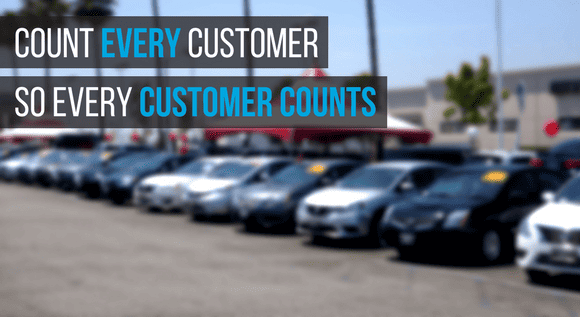You and your CRM data have a fantastic relationship.
It’s a give and take. You input information, and it gives you data that accurately reflects your dealerships performance 100% right? At this point you might be chuckling at that idea of someone actually believing something so ridiculous. Good for you, you understand what I’m getting at.
We all know that, even today, the idea of a salesperson logging every up into the CRM is just a fantasy. The question is, how far from the truth are the numbers in your CRM? Surely it can’t be more than a small percentage of customers that are never logged into your CRM. Well, if you believe that then you might be unpleasantly surprised. Typically, 40% of walk-ins never reach your CRM.
Managers globally KNOW this is happening, and simply accept it. Evidently these managers have resigned themselves to the “this is just how things are,” kind of thinking. How is that acceptable? It’s time to get our act together!
Managers, get this: Every. Single. Person. Counts.
One is Greater Than Zero
Gary Vaynerchuck, author of Jab, Jab, Jab, Right Hook, recently shared an idea he calls “One Is Greater Than Zero,” which emphasizes that the DEPTH of a conversation is often much more valuable than the WIDTH. In other words, the quality of the conversation between yourself and other people is much more important than the number of people you are having a conversation with.
Stop losing customers because you see them as a tiny drop in the bucket, or because you’re too impatient. Put the work in every step of the way, and keep in mind that every step doesn’t necessarily directly make you money.
When you look at the big picture, you’ll start to realize that the seemingly unnecessary step is not only 100% needed, but WILL make you money in the end.
I guarantee that you vastly undervalue the potential impact that ONE customer has on your dealership. Shortsightedness does that to a business. Every person that somehow interacts with your dealership has the chance to become exponentially more than a single sale.
IF you treat them really well, IF you follow up, IF you give of your time and effort in an extraordinary way, THEN you will get the ROI numbers you’ve been looking for.
Plus, as an owner, ask yourself this: how well do you really think managers are doing with training and managing if they don’t know what’s going on? And I can tell you for certain that if managers never even knew that 40% of your customers exist, there is not enough management involvement.
Traditionally, of course, management involvement might have sounded like this: “Hey! Go follow up with customers. Oh, but don’t forget to help customers on the floor too.” That sounds like some serious Office Space style management, and everyone hates it! Why? Likely because the management’s demands are extremely inefficient and causes conflict in your dealership.
For instance, when someone is told to follow up with people (at their desk) and then told to help walk-ins (on the floor) at the same time, there is a problem. You can’t do both at the same time! Not well at least. Even if you’ve placed several sales desks right up front in the showroom you still have the exact same problem.
Consider This Scenario
A sales rep is following up with a customer over the phone. A customer walks into your dealership. IF that sales rep sees the customer walk in the door, what do you think will happen next? More than likely, that salesperson (and others) will compete to hurriedly get off the phone to handle this more immediate opportunity. IFIF
That’s understandable, and the salesperson isn’t to blame. The salesperson saw a greater opportunity and seized it. But, in the long run, that consistent activity is horribly inefficient for a dealership. After all, how will that potential customer on the phone feel? People know when they’re being rushed off the phone.
Competition is great, it’s what makes us work harder, and we should never stop competing. However, we need to realize, that customers would rather have us compete to improve their buying experience and not our personal financial experience. The common misconception is that you can only have one or the other.
You can either be a dealership where salespeople can easily make six figures, or you can have customers love you while salespeople see their bank accounts shrink. We often “choose” to let our salespeople flourish, but in doing so we have created an internal “Us vs. Them” culture by default.
YOU DON’T HAVE TO CHOOSE!
I actually started working in the car business back when I was 18. After working my way into management, I found myself perpetuating the exact problems that I’ve been discussing now. I’ve been the guy who told his reps to go follow up and handle walk in’s at the same time, so I understand. I noticed the conflict this created for customers back then, but I also noticed the conflict that I had created between my team and myself.
One of the points of tension for my team involved the fact that unhealthy actions were often rewarded (financially) while those who did follow up seemed to miss opportunities for increasing their sales. There didn’t seem to be much that could be done, as I had certain quotas that needed to be met. So what did I do?
I figured out a way to reward beneficial behavior, while also leaving my salespeople unshackled. The last thing I wanted to do was restrain great talent. However, I also did not want to cater to one group of talented salespeople. Despite what you might think, there are several types of salespeople that can be hugely successful and not all of them succeed under such a chaotic system. That doesn’t make them “weak,” as so many assume.
For example, in more recent times I was brainstorming with a dealer friend of mine who mentioned a struggling new saleswoman. She was new, but even so, selling 3-4 cars in a month was making my friend think she just wouldn’t make it. This had been troubling him because he personally felt that she did have a great deal of potential. He just wasn’t sure what was holding her back.
After speaking at length, I suggested trying a new system for managing his floor. It’s called managing your floor. Surprise! That struggling saleswoman immediately went from selling 3-4 cars a month to selling 20 a month. (If you’re curious, she wasn’t let go after that.) It turns out, when someone can focus on the customer in front of them and also have time to set appointments, they can be extremely productive.
Don’t get me wrong. The “strong” salespeople also deserve a second glance. When we are looking at the inaccurate CRM data, there’s more to a salesperson’s stats than the number of cars they sold.
- How many test-drives have they given?
- How many appointments have they created for the dealership?
- What is their closing ratio if you include mishandled customers that were never entered into the CRM?
All of these are important questions that should be considered. Getting the data to show all of that information is much easier than you might expect.
While it might be hard, or make you feel uneasy, we really should constantly reevaluate ourselves. Let’s take a good, long look at our “success” to ensure that it lasts. There can be lots of underlying issues that can be affecting the health of your dealership, but if you take the time to reassess then you WILL be ahead of the curve. Long term success is a matter of will, so let’s decide to invest in ourselves in order to succeed.



